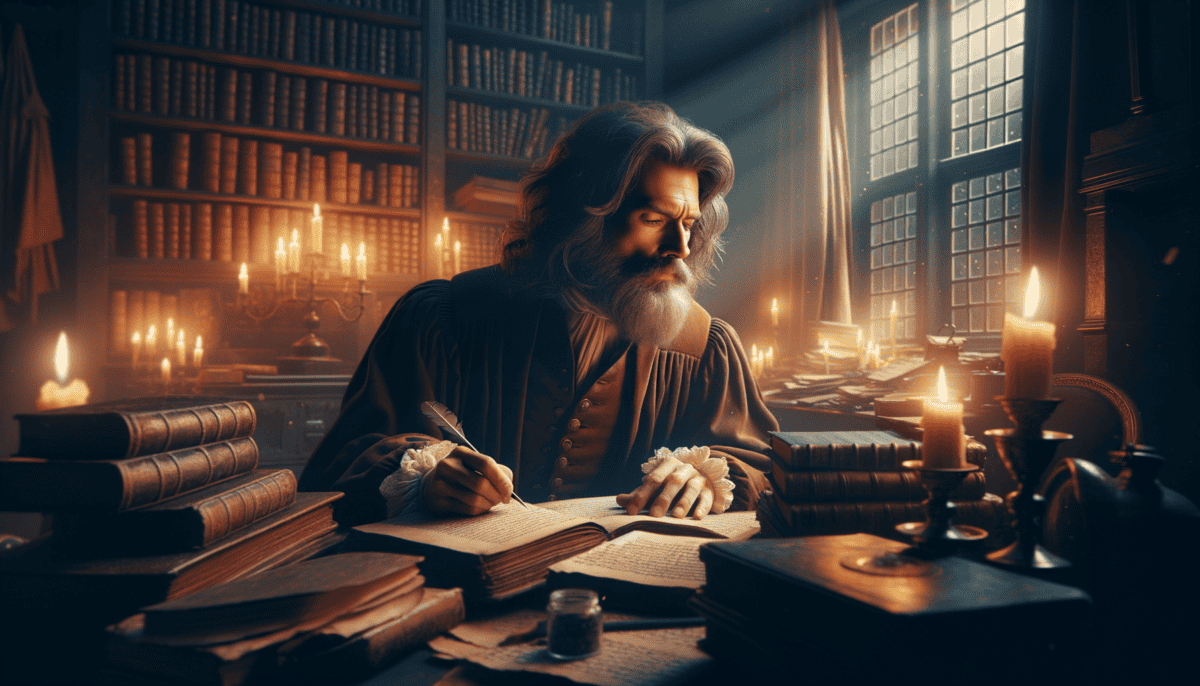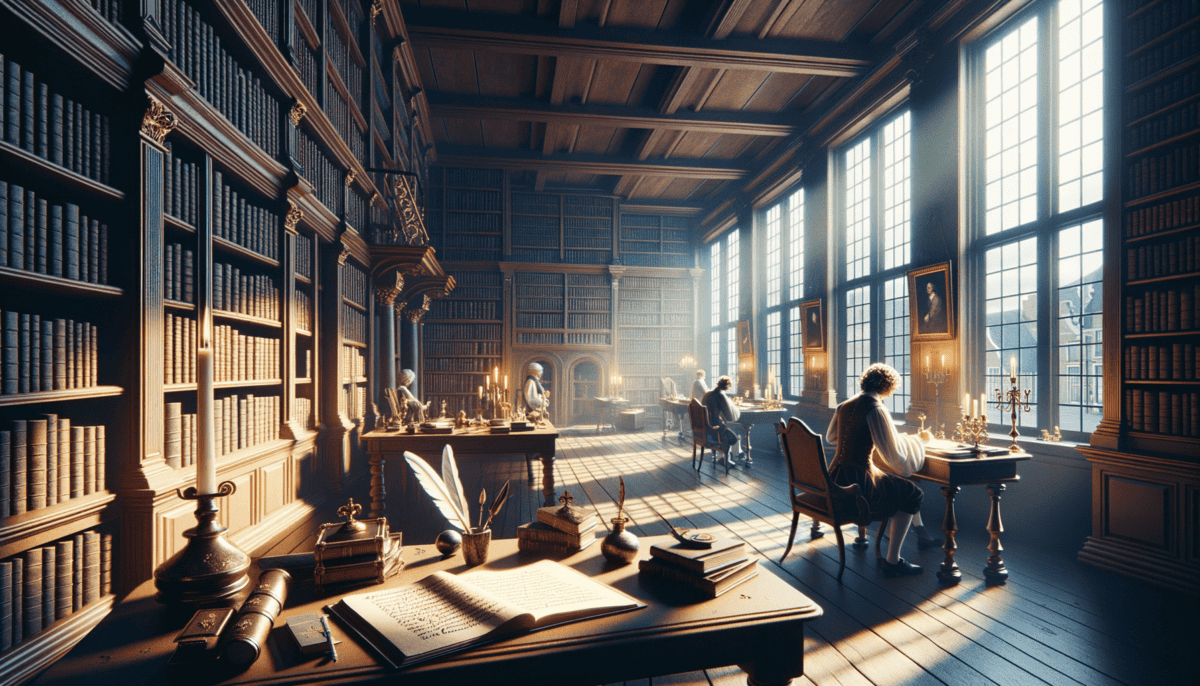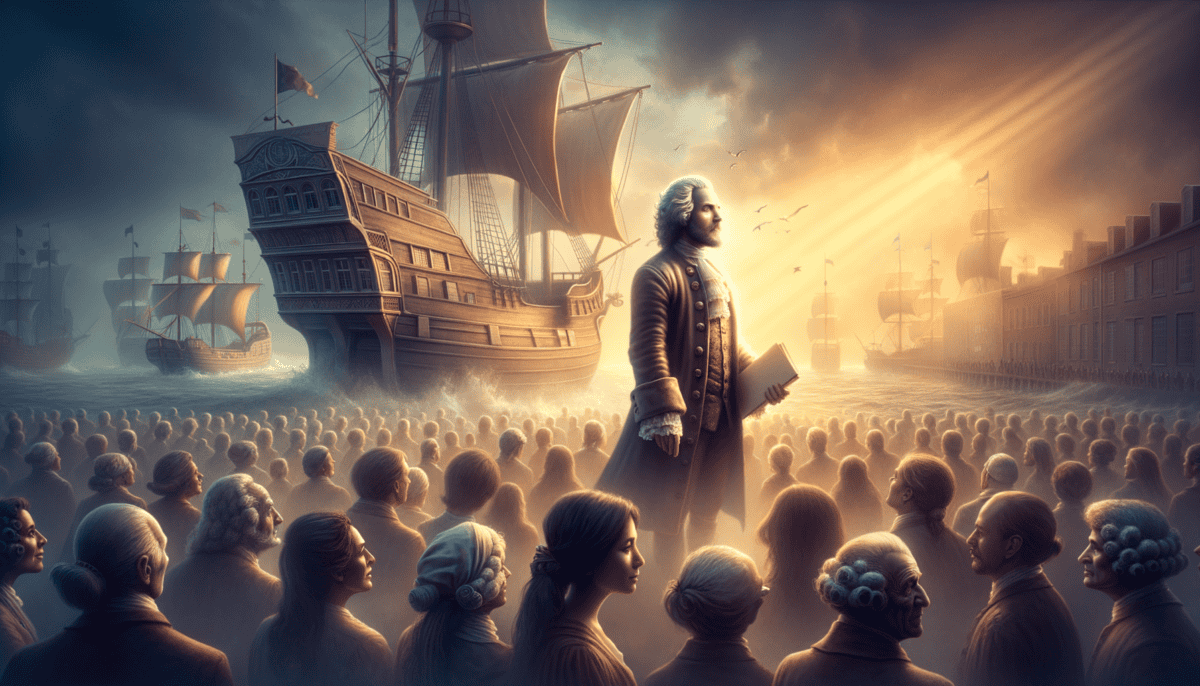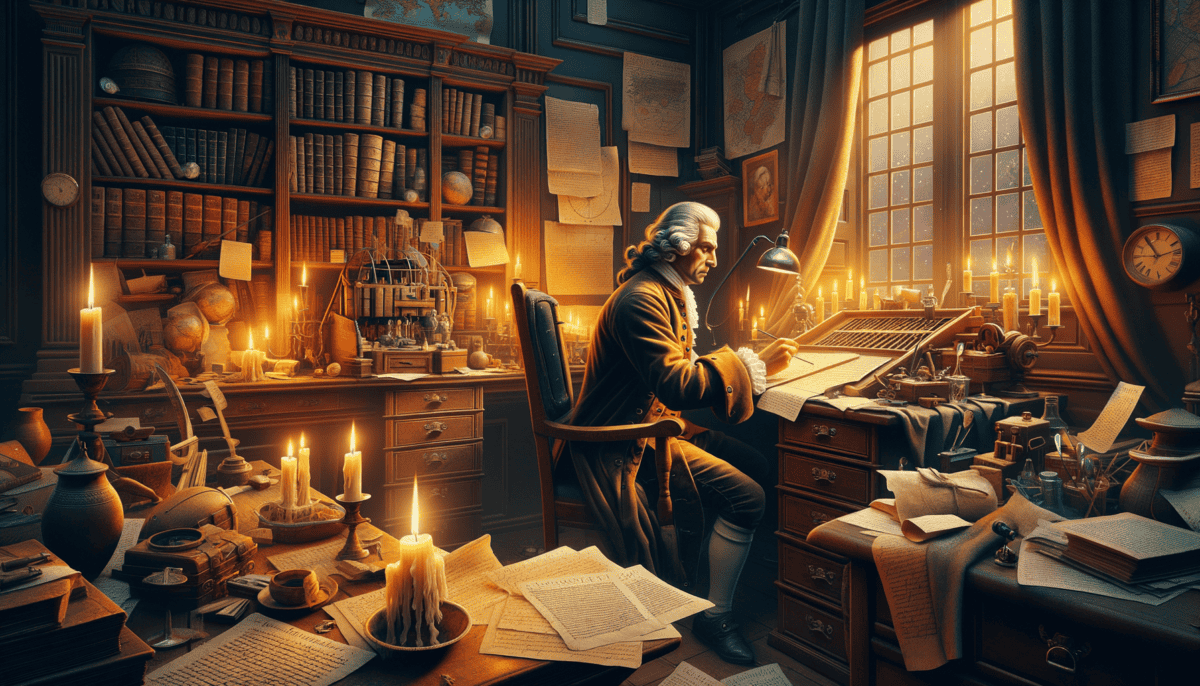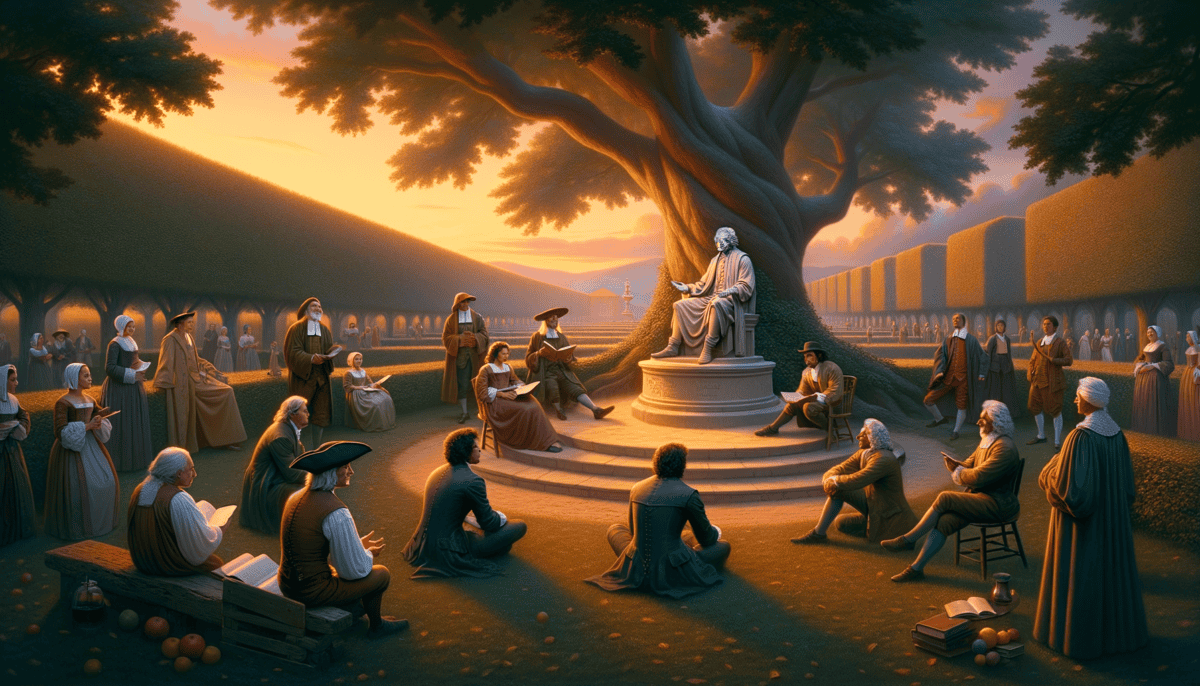A Boy Named John
The rain fell softly on the cobblestone streets of Wrington, England. A small boy with bright eyes looked out his window. The year was 1632, and this boy was John Locke. ️
"John, come help with the books!" called his father, also named John. Young John loved helping in his father's law office. The smell of paper and ink made him smile.
“Father, why do some people get to make all the rules?” John asked one day, watching rich nobles ride by in fancy carriages.
His father paused, looking thoughtful. "That's how it's always been, son. The king and nobles rule because they say God chose them."
But young John wasn't satisfied. He watched as poor farmers worked hard but stayed poor. He saw how some people had everything while others had nothing.
One cold morning, soldiers marched through town. They were taking money from people who didn't support the king. John saw his neighbor, Mrs. Baker, crying as they took her savings.
"But why?" John asked his mother. "Mrs. Baker works so hard at her bakery."
"Some questions are dangerous to ask, dear," his mother whispered. But John couldn't stop thinking about it.
At school, John was different from other kids. While they played games, he asked big questions:
• Why do some people have more rights than others?
• Who decides what's fair?
• Why can't everyone be treated the same?
His teacher, Mr. Thompson, noticed John's curious mind. "You think deeply, young Locke. But be careful – such thoughts can get you in trouble."
One day changed everything. John saw royal guards arrest a man for speaking against the king. The man's children cried as he was taken away.
That night, John wrote in his diary: "There must be a better way. People should have rights that no one can take away – not even kings."
As John grew, so did the troubles in England. People whispered about war between the king and parliament. Young John watched and listened, learning from everything he saw.
The Promise
On his thirteenth birthday, John made a promise to himself. He would find answers to his questions. He would discover why some people had rights while others didn't.
"Knowledge is power," his father always said. So John read every book he could find. He learned about governments, laws, and history.
The other children didn't understand him. "Why do you always read?" they asked. But John knew he was on an important path.
His mother worried about his serious nature. "John, dear, you should play more."
But John had discovered something exciting – ideas could change the world. And he had many ideas growing in his young mind.
Through the window of his father's law office, John watched England change. He saw unfairness everywhere. But he also saw hope – hope that things could be different.
"Someday," he whispered to himself, "I'll help make a world where everyone has rights. Where kings can't just take what they want. Where being fair matters more than being powerful." ⚖️
As the sun set over Wrington, young John Locke had no idea how right he was. His ideas would indeed change the world – but first, he had many challenges to face.
Ideas That Changed Everything
Young John Locke walked through the gates of Oxford University. The tall stone buildings made him feel small. But his mind was full of big ideas.
"Welcome to Christ Church College," said his professor, Dr. Wells. "Here, you'll learn how the world works."
But something bothered John. His teachers kept saying kings ruled because God chose them. This didn't make sense to him.
"If God gives kings their power," John wrote in his notebook, "why are some kings bad? Why do they hurt people?"
Late at night, John would write his dangerous ideas. He believed everyone was born with special rights. Rights to live freely, to own things, and to be safe. No king could take these away. ✍️
Secret Meetings
John made new friends at Oxford. They met in hidden places to talk about their ideas. One friend was James, who loved science as much as John did.
"Be careful, John," James warned. "The king's men are watching the university. They don't like new ideas."
One day, soldiers came to Oxford. They were looking for people who wrote against the king. John quickly hid his notebooks under his bed.
John started using secret codes in his writing. He gave his friends fake names in his notes. They called their group "The Natural Rights Club."
His ideas grew stronger:
• People should choose their leaders
• Everyone deserves to be treated fairly
• No one should have too much power
A scary moment came when guards searched John's room. But they didn't find his hidden writings. That night, John knew he had to be more careful.
"Your ideas are spreading," James told him one day. "Students are talking about rights and freedom."
The word was getting out. More people wanted to hear John's ideas about natural rights. But this made him a target.
Close Call
One rainy evening, John heard boots on the stairs. Royal guards were coming! He grabbed his most important papers and ran. Through the rain he went, heart pounding. ♂️
"Professor Wilson will hide you," James said. The kind old professor kept John safe until the guards left.
"Sometimes being brave means being scared but doing the right thing anyway," John wrote later.
John earned his degree from Oxford, but his education wasn't over. His dangerous ideas were just beginning to grow. He knew there would be more challenges ahead.
Looking out over Oxford's spires one last time, John made another promise. He would keep fighting for what he believed in. His ideas about freedom and rights were too important to keep secret forever.
The world was changing, and John Locke's thoughts would help change it. But first, he would have to leave England behind…
Finding Freedom in Holland
The boat rocked gently as John Locke watched England disappear into the fog. He held his precious notebooks close. They were filled with his ideas about freedom.
“Welcome to Holland,” said a friendly voice when they reached land. It was Peter, a Dutch scholar who would help John find a new home.
John found a small house near Amsterdam’s canals. For the first time in years, he felt safe enough to write openly. ✍️
New Friends, New Ideas
“Come meet my friends,” Peter said one evening. “They love talking about big ideas too!”
John joined a group of thinkers who met at a cozy coffee shop. They came from many different countries. All of them had run away from places where they couldn’t speak freely.
“In Holland, we can say what we really think,” smiled Maria, a writer from Spain. “No one will put us in jail for our ideas.”
Every week, they shared their thoughts about freedom and rights. John’s ideas grew bigger and stronger.
The Big Book
One morning, John started writing his most important book. He called it “Two Treatises of Government.” It explained why everyone deserves to be free.
His main ideas were simple:
• All people are born free and equal
• Leaders should help people, not hurt them
• People can choose new leaders if the old ones are bad
“Your words will change the world,” Peter told him. “But we must keep them safe until the right time.”
The Great Escape
Getting the book back to England would be tricky. John’s friend Thomas had a clever plan. He hid pages of the book inside barrels of Dutch cheese!
“The guards never check the cheese too carefully,” Thomas winked. “They don’t like the smell!”
Page by page, John’s dangerous ideas snuck back into England. More people learned about natural rights and freedom.
Life in Holland was peaceful. John could walk freely through the streets. He didn’t have to hide his writings anymore. But he missed England.
“Sometimes we have to leave home to make it better,” he wrote in his diary.
News from England started to change. People were talking about having a new kind of king – one who would listen to the people. Maybe soon it would be safe for John to go home.
Until then, he kept writing and sharing his ideas. Each word was a small step toward making the world more free.
Big changes were coming to England. Would John’s ideas help make them happen? The answer would soon become clear…
A Revolution Comes Home
The sea breeze felt different this time. John Locke stood on the ship’s deck, watching England grow larger. After five long years in Holland, he was finally going home.
“Welcome back, Mr. Locke!” called his old friend Mary from the dock. “You’ve picked an exciting time to return!”
A New England
The streets of London buzzed with energy. People talked freely about their rights. No one was afraid anymore.
“Things are different now,” Mary explained. “The new king and queen say they will listen to the people.”
John smiled. Maybe now was the time to share his big ideas about freedom with everyone!
Brave New Words
John’s friend William worked for the new leaders. “They want to meet you,” he said. “They’ve heard about your ideas.”
The palace was huge and sparkly. John held his book tightly as he walked in. His heart was beating fast.
“Tell us your thoughts about freedom,” the new queen said kindly.
John took a deep breath and spoke:
• Every person is born with rights that no one can take away
• Leaders must protect people’s rights
• People should have a say in their government
Ideas Spread Like Wildfire
Soon, everyone wanted to read John’s book. People made copies and shared them with friends.
“Your words give us hope,” said Sarah, a teacher. “They help us understand why freedom matters.”
All across England, people started talking about natural rights. They weren’t afraid to speak up anymore.
Making Changes
The new leaders made better laws. They promised to:
“Protect people’s rights”
“Listen to what people want”
“Be fair and kind to everyone”
John’s friend Thomas visited from Holland. “Look what your ideas helped do!” he said proudly. “You changed England!”
But John knew this was just the beginning. His ideas were starting to spread to other countries too. People everywhere wanted to learn about natural rights.
One day, a letter arrived from across the ocean. Some people in America wanted to know more about John’s ideas. What would happen when his words reached the New World?
Ideas Cross the Ocean
John Locke sat in his cozy study, holding a letter from America. His hands trembled with excitement as he read the words.
“Dear Mr. Locke,” the letter began. “Your ideas about freedom are spreading through all thirteen colonies. We want to build a new kind of country based on your teachings.”
Across the Big Ocean
John smiled as he thought about his words traveling so far. “Who would have thought my ideas would sail across the sea?” he said to his cat, Whiskers.
More letters kept coming from America. People there were very excited about natural rights:
• Life and freedom belong to everyone
• People should choose their leaders
• Everyone deserves to be treated fairly
• No one should be bullied by kings
Meeting Young Benjamin
One sunny morning, a young man from America visited John. His name was Benjamin Franklin.
“Your books are everywhere in Philadelphia,” Benjamin said. “People read them in their homes and talk about them in coffee shops.”
John’s eyes lit up. “Tell me more about America,” he said.
Dreams of Freedom
That night, John couldn’t sleep. He thought about all the people in America reading his words.
“Maybe they will do something amazing with these ideas,” he whispered to Whiskers. “Maybe they will make a new kind of country where everyone is free.”
Seeds of Change
More visitors came from America. They all said the same thing:
“Your ideas are helping us dream of a better way to live”
“We want to build something new”
“You’ve given us hope for the future”
John wrote back to all his American friends. “Be brave,” he told them. “Stand up for what you believe in.” ✨
One day, another letter arrived. The Americans were writing something called a “Declaration.” They wanted to use John’s ideas about natural rights to tell the world why everyone deserves to be free.
John smiled. His words had planted seeds of freedom. Now those seeds were growing into something bigger than he ever imagined. What would happen next?
A Dream Becomes Real
The morning sun streamed through John Locke’s window as he read the most amazing news yet. The Americans had done it! They made a new country based on natural rights!
“Listen to this, Whiskers,” John said to his cat, reading from the paper: “We hold these truths to be self-evident, that all men are created equal…”
All Around the World
More and more people started talking about natural rights. John’s ideas spread to:
• France
• Spain
• Italy
• Countries all over the world!
“It’s like dropping a pebble in a pond,” John told Whiskers. “The ripples keep going and going!”
A Special Visit
“Mr. Locke, your ideas have changed everything,” said Maria, a young student from France. “People everywhere are talking about freedom and rights!”
John smiled. He remembered being a young student himself, wondering if one person’s ideas could really make a difference.
Looking to Tomorrow
John sat in his favorite chair, thinking about the future. “What do you think, Whiskers? Will people still care about natural rights many years from now?”
He picked up his quill and wrote one last message:
“To anyone who reads these words: Remember that you were born free. You have the right to life, liberty, and to follow your dreams. Never let anyone tell you different.”
Forever Free
Today, John Locke’s ideas still help people fight for freedom. When kids learn about rights in school, they’re learning what John figured out long ago – everyone deserves to be treated fairly! ⭐
Whenever people stand up for their rights, they’re carrying on John’s dream. His story teaches us that thinking big thoughts and being brave enough to share them can make the world better for everyone.
And that’s how a curious boy who questioned everything grew up to help build a world where people could be free. His ideas live on in every country, every classroom, and every heart that beats with hope for freedom.


